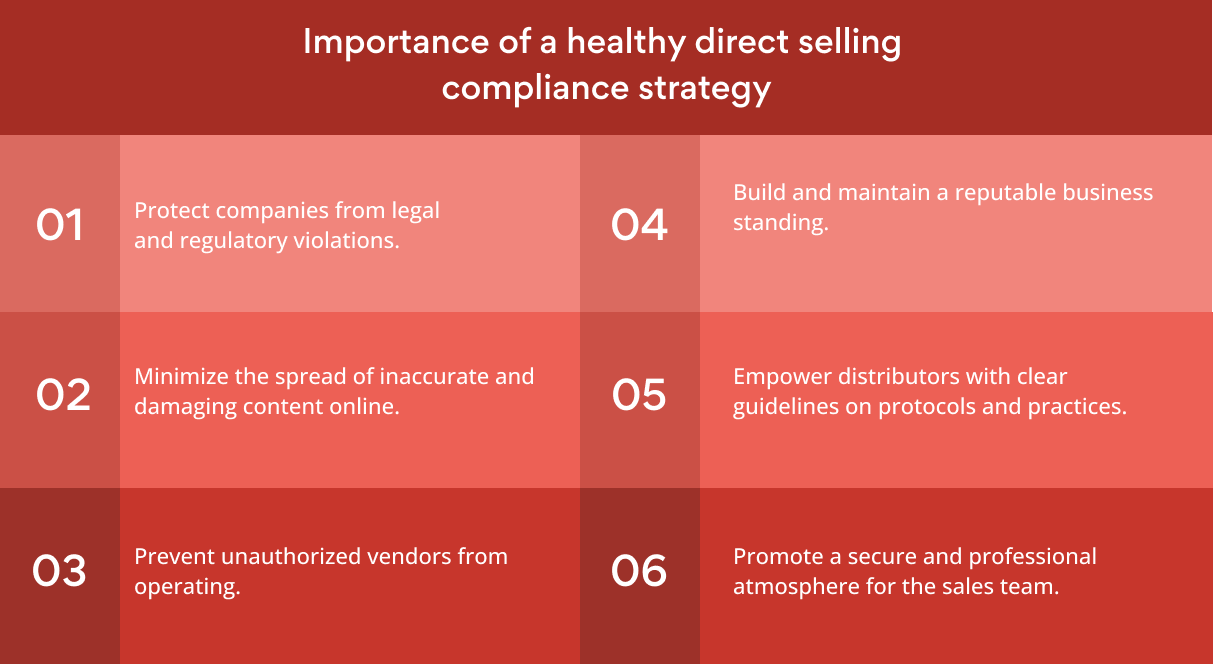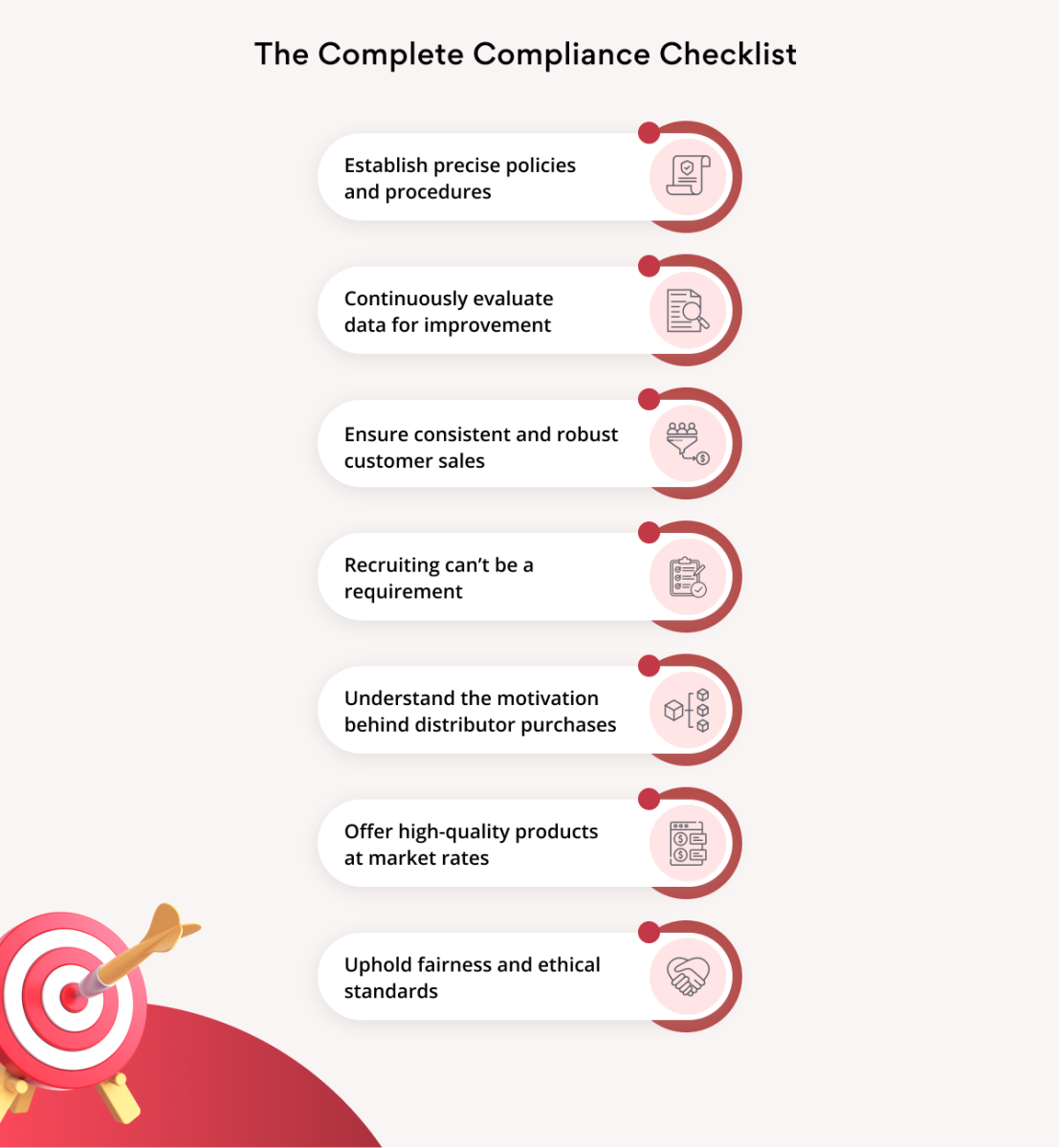Compliance have come a long way from being seen as an obligation much like taxes and insurance to becoming a building block of corporate responsibility and ethical governance. However, despite its growing significance, it is one of the least understood facets of the business landscape.
What is compliance?
Compliance is a process businesses use to check how they align with industry regulations and guidelines. It helps a company stay on the right side of the law and avoid legal hassles and monetary penalties. In simpler words, compliance keeps your business out of trouble.
In today's world, direct selling companies face a tougher regulatory landscape as the business trends have become more volatile with time passing by, and when this happens, regulations can rapidly change. With new laws popping up all the time, there's a growing global focus on consumer privacy and data protection as well as environmental resilience.
At its core, Epixel MLM Software is all about helping direct selling businesses stay on the right side of the law. Given the intricate nature of direct selling and the ever-evolving regulations, Epixel comes with a solid mission—to streamline this process by allowing companies to focus more on their products and services all while remaining compliant.
Importance of a healthy direct selling compliance strategy
To maintain legal and ethical integrity, your business must meet the standards, regulations, and ethical codes relevant to the direct selling industry. To make this happen, implement a healthy compliance strategy because it can

- Shield companies from legal and regulatory offenses.
- Reduce the prevalence of damaging and false information online.
- Prevent rogue sellers.
- Establish a reputable business reputation.
- Uphold clear guidelines regarding acceptable practices and operational protocols.
- Make salesforce feel that they work in a secure and professional environment.
Above all, a direct selling company that prioritizes compliant behavior can avoid paying hefty fines or facing potential lawsuits due to negligence. Take Neora, for instance. They're a big player in science-based skincare and wellness. They went toe-to-toe with the Federal Trade Commission (FTC) for seven long years. Their strong commitment to following the rules was a key reason that marked their historic victory. Their robust compliance program, ‘rigorous’ and ‘robust’ as said, was the reason the FTC didn't push for harsh penalties.
In her words,
Compliance is not the enemy. When we embrace the idea of compliance, it not only protects us, it helps us build a stronger business. We need to flip the script and normalize it as a foundational business requirement. Compliance is not a separate entity to be navigated. It’s something we need to champion.

Heather Chastain
Every company is at risk of non-compliance, and it has become one of the core reasons why MLM companies fail. This means that following the rules—compliance—is more important than ever. So, our next step forward is to cover all the aspects of one significant question that demands your attention:
Do I have a robust, documented, enforced compliance program?
Compliance becomes increasingly crucial as a business grows and faces different challenges and audits. However, this isn't an excuse for ignoring best practices. So, before we tick off the upcoming list, let’s check it out first.
Introducing the new direct selling compliance checklist
Whether your business is large or small, if you're serious about growing, it's essential that you have a solid foundation of compliance right from the start. So, by prioritizing compliance from day one, you're not just checking these boxes—you’re laying the groundwork for a business that can thrive, adapt, and withstand whatever challenges come your way.
Keep those pens at the ready from here on.

Establish precise policies and procedures
Compliance needs to start from the top, and your risk assessment should shape your policies and procedures. These policies must detail the legal framework, industry standards, and governmental regulations around managing your business, salesforce, and customers.
Now, when your distributors hit the sales field, they might not all know the ins and outs of what they can and can't say about products and income. That's where a solid policies and procedures document comes in handy. It sets the expectations for how everyone should act, whether in person or online. And if someone slips up, having these policies in place makes it easier to sort things out quickly and deal with repeat offenders.
Bold suggestions:
Develop policies that fit with your compliance goals to make sure you're on track.
Make sure your internal teams can lend a hand to distributors when it comes to developing compliant marketing materials and treating everyone fairly, no matter their rank.
Continuously evaluate data for improvement
As we've touched on before, compliance isn't a one-and-done task—it's something we need to stay on top of. So, the ongoing process of managing compliance requires constant review of existing compliance while also updating internal policies as the regulations continue to change with time.
Managing data efficiently, followed by quarterly review meetings opens up a plenty of room for improvement and innovation. With relevant data readily available, direct selling companies can fine-tune their approaches all by fostering a culture of accountability and integrity.
Bold suggestions:
Consider regularly reviewing your documented policies and procedures to see if they’re still relevant, current, and direct.
Set up a robust data security plan to safeguard your company's digital data from cyber threats, while also looking out for insider risks and human errors that could lead to potential data breaches.
Ensure consistent and robust customer sales
Selling to customers who aren't part of compensation plans matters, but that’s not the whole story. Companies need to show it's happening.
In the case of a direct selling firm like Neora, the largest portion of sales are from existing customers—those who are loyal to the products—rather than solely from acquiring new customers.
If you don’t have customer sales-and you won’t if you don’t incentivize your field to sell to customers—then you’re not going to pass the test.

Deborah K. Heisz
Bold suggestions:
Focus more on subscription-based programs, loyalty programs, and programs that foster repeat purchases.
Incentivizing distributors is important for brands in order to effectively establish and build a positive relationship with customers.
Recruiting can’t be a requirement
In direct selling, forcing purchases is a big no-no. It is a non-compliant behavior. Distributors should have the freedom to earn commissions and climb the ranks without being required to make monthly purchases themselves.
Moreover, they shouldn't be pressured into recruiting or building a team in order to earn income. Companies in direct selling need to find a balance between encouraging teamwork and respecting their distributors' freedom.
Bold suggestions:
Design programs that reward distributors earn from customer sales—an essential component in company’s overall growth.
Make sure distributors focus on genuine sales efforts and the value they bring to their customers, not on internal purchases or recruitment quotas.
Understand the motivation behind distributor purchases
You know, there are all sorts of reasons why distributors buy. It could be because of product discounts, their love for the product or even because the sense of community they find within a particular company. Making money doesn't always come first on the list.
Sometimes, former customers who used to just buy products become distributors themselves later on. They're drawn to the value they get in exchange for their money—it's a fair trade.
Bold suggestions:
Begin by offering valuable goods and services in return for their money.
Always keep things open and honest in your business interactions. This way, distributors will feel valued and respected in their journey with the company.
Offer high-quality products at market rates
Offering high-quality products at market rates goes beyond just selling them. It’s about building trust and value among your customers. A good exchange for their investment is all customers look forward to.
So, if compliance is relevant to you, then the quality of a product at a reasonable market price must also stay relevant.
Bold suggestions:
Products must be of high quality as well as at an affordable price.
Leverage market research, gather customer feedback, and conduct surveys in order to analyze whether your products align with customers' price preferences.
Uphold fairness and ethical standards
Keep in mind that the higher the risk, the more crucial attention to detail becomes. Therefore, fairness in each step of the company’s take is the only way in and out.
Recent findings from Harvard Business Review say that a perception of fairness in the employee experience can enhance performance by up to 26% and employee retention by up to 27%. To achieve this, direct selling companies need to adopt practices that remove hidden fees, fine print, and unexpected charges. And most importantly, the program must be fair to everyone.
Be fair and honest and don’t hit people with a hidden fee or some task they have to do to build a business.

Deborah K. Heisz
Bold suggestions:
Ensure distributors aren't burdened with spending money out of their pockets every month, and they are able to make money without bringing in new member.
Some steps to think about include reducing sign-up fees, doing away with renewal fees, and offering free access to back-office platforms.
Predict regulatory risks and implement practical solutions
A Forbes Technology Council report revealed that compliance fines totaled $95 million for one Fortune 500 company.
Regulatory reg flags are those warning signs that indicate potential violations or non-compliance of an organization with regulatory requirements. Among them, the most significant may include potential flaws in compensation plan structure, joining costs or expenses to build a business, and customer-to-distributor ratio.
When direct selling companies take the initiative to tackle potential risks head-on and put protective measures in place, they're not just minimizing legal headaches—they're also showing they're serious about ensuring their alignment with industry standards. Whether it's fine-tuning income claims, tweaking return policies, or just being more transparent overall, these steps build trust among customers. So, taking proactive steps is crucial.
One such step is building a culture of shared compliance responsibility across the organization. Records show that this growing dedication can work well with the evolving compliance function, from being reactive advisors to becoming a proactive partner to the business.
An Accenture study found that around nearly half of respondents plan to upskill their compliance team to drive a culture of compliance across the enterprise, while about 40% intend to invest in new technology for this purpose.
This study also sheds light on another critical aspect: the role of technological advancements in ensuring compliance in direct selling. After all, keeping up with these innovations is key to staying on top of compliance challenges.
Find out from our customers how our solutions give MLM businesses an edge and exceed customer expectations
Exploring tech opportunities in the face of MLM compliance challenges
Once a company has identified those red flags and established robust policies and procedures, then ongoing monitoring stands tall. This can feel like a gigantic, overwhelming task considering how vast the internet is and how far direct selling businesses have expanded across the globe through various internet platforms.
This is where the need to break away from manual MLM compliance monitoring methods comes into effect. Automated Compliance Monitoring (ACM) helps in streamlining the workflow of an organization by monitoring security policies, accounts, and inventories, and makes sure their knowledge base stays current with the latest security standards.
And this switch to embracing new technologies has made MLM compliance frameworks to be no longer seen as bureaucratic hurdles but rather as enablers of operational efficiency and ethical conduct.
We’ve neared the end of this checklist, so now you’re quite ready to tick two important boxes that voices your success:
- Promoting integrity
- Building trust
Done with ticking? Then it's time to continue your network marketing journey toward compliance and beyond.
- Why a sound compliance strategy matter
- Complete compliance checklist
- Precise policies
- Review data constantly
- Robust customer sales
- Recruiting can’t be a requirement
- Know the motivation behind distributor purchases
- High-quality products at market price
- Fairness and ethical conduct
- Regulatory risks and practical solutions
- Automating compliance









Leave your comment
Fill up and remark your valuable comment.